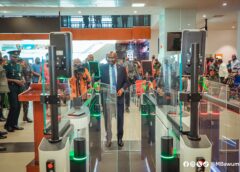In this era where artificial intelligence and data analytics are reshaping industries worldwide, Africa’s logistics and supply chain sector stands at a crucial turning point of digital transformation. At the forefront of this evolution is Olufunmilayo “Funmi” Abodunrin, a rising expert who embodies the perfect blend of traditional logistics expertise and cutting-edge technological innovation.
In this insightful interview, Abodunrin, who playfully describes herself as a “Yoruba girl from Ghana,” shares her unique perspective on how AI and data analytics are revolutionizing African supply chains.
From tackling Africa-specific challenges to exploring new workforce dynamics, this conversation delves into the real-world applications and implications of AI in one of the continent’s most critical sectors. Through her eyes, we get a ground-level view of how data-driven approaches are transforming traditional supply chain practices and what this means for Africa’s future in global logistics.
1. Please introduce yourself to our dear readers
I like to refer to myself as a “Yoruba girl from Ghana,” proudly representing the two nations that define me. My name is Olufunmilayo, which means “God brings me joy,” though most people call me Funmi. I’m currently on an exciting journey, exploring the intersection of Data Analytics and AI to drive impactful decision-making in the logistics and supply chain industry.
With a strong foundation in Ports and Shipping from my first degree at the Regional Maritime University, I deepened my expertise by pursuing a Master’s in Supply Chain Management at the Ghana Institute of Management and Public Administration (GIMPA). My passion for the logistics space evolved naturally, but my journey into tech was a bit more unexpected.
It all began last year when a flyer from Azubi Africa at the Ghana Digital Innovation Week piqued my curiosity about data analytics. That interest led me to enroll in their Data Analysis course. I also participated in the AI Career Essentials (AiCE) program with ALX Ghana, where I explored various AI tools. You can check out my portfolio and projects here.
My true “aha” moment came during a course on Supply Chain Analytics at GIMPA. It was a turning point for me—I realized how deeply AI and data analytics could transform the logistics industry. Now, I’m committed to learning how these skills can help African businesses streamline supply chains, boost efficiency, and cut costs.
- How is data analytics transforming the logistics and supply chain nowadays?
The supply chain can be understood as all the stages involved in fulfilling a customer request—from suppliers and manufacturers to retailers and customers. Traditionally, decisions in supply chains relied heavily on intuition and historical data, which often struggled to keep up with today’s market volatility. Now, data analytics is revolutionizing the industry by providing real-time insights that enable faster, more accurate decision-making. Predictive and prescriptive analytics help businesses not only forecast future outcomes but also optimize their operations in ways that intuition never could.
AI and data analytics are also transforming supplier relationships. Issues like poor communication and misaligned incentives are being resolved with the help of AI tools, fostering more transparent and efficient collaborations. For example, AI allows businesses and suppliers to share resources and align incentives more effectively, improving joint decision-making and strengthening partnerships.
When it comes to inventory management, data analytics is a game-changer. Businesses can now predict seasonal demand, track market trends, and respond to global supply chain fluctuations with unprecedented accuracy. Techniques like association and market basket analysis help retailers understand customer behavior, such as which products are frequently bought together, allowing for smarter stock management and personalized customer experiences.
Logistics and route planning have also seen significant improvements through data analytics. Businesses can now optimize routes based on real-time traffic and weather data, reducing transportation costs and improving delivery efficiency. In addition, customer segmentation powered by data enables businesses to prioritize and customize their services, enhancing the overall customer experience.
Also, data analytics plays a crucial role in risk management, helping companies anticipate and mitigate disruptions in the supply chain. With predictive tools, businesses can foresee potential risks, such as political or environmental issues, and take proactive steps to minimize their impact.
The list is endless.
- What are the main areas of logistics and supply chain in Africa currently benefiting the most from data analytics and AI?
Africa’s complex and vast logistics and supply chains are increasingly leveraging data analytics and AI to tackle challenges and optimize operations, driving greater efficiencies.
Key areas seeing significant improvement include shipment tracking, where real-time visibility powered by IoT devices and data analytics helps businesses monitor goods, reduce delays, and optimize deliveries.
Warehousing is being transformed as well, with AI enhancing inventory management and demand forecasting. Businesses can now predict stock needs more accurately, reducing overstocking or stockouts, while being more responsive to market trends.
Machine learning has enabled businesses to achieve more precise customer segmentation by analyzing behaviors and preferences, allowing for personalized services and optimized resource allocation. Additionally, AI-powered chatbots are transforming customer service by providing real-time, automated responses, enhancing the customer experience with quicker, more efficient service while freeing up human resources for more complex tasks.
In transportation, predictive analytics improves route planning and fleet management by analyzing traffic, weather, and fuel data. This allows businesses to minimize delays and cut costs.
- What Africa-specific obstacles are companies facing when implementing AI solutions in their supply chains?
I understand the potential of AI when applied thoughtfully, but several obstacles, particularly within the African context, prevent companies from fully harnessing its benefits. Here are some hurdles:
- Limited Access to Quality Data: Data is the oil that powers AI, but sadly African businesses lack the infrastructure to collect, store, and manage it effectively. Poor digital infrastructure, particularly in rural areas, makes it hard to gather real-time supply chain data. Even when data is available, it may be incomplete or inconsistent, reducing the reliability of AI insights.
- Shortage of Skilled Personnel: Africa faces a significant shortage of skilled personnel in AI, particularly data scientists and AI experts, which makes it challenging to implement and manage AI systems effectively. To address this gap, there’s a need to expose students to diverse career opportunities in AI beyond traditional roles, encouraging more interest and expertise in this critical field.
- High Cost and Resource Constraints: High costs and resource constraints are major barriers to AI adoption for many African SMEs, which make up a large part of the economy. The expenses involved in acquiring AI technology, training personnel, and collecting data are often high.
- Outdated Systems and Infrastructure: Many businesses are stuck using outdated systems that can’t handle AI integration. These rigid infrastructures make it hard to adopt AI without major overhauls. In industries where most of the budget goes to basic operations instead of tech upgrades, this becomes an even bigger challenge, slowing down the digital transformation that’s needed for AI to work effectively.
- Functional Silos and Poor Collaboration: In some African businesses, only specific departments are trained in new technologies, which hinders AI’s effectiveness. For AI to work optimally, all departments must be aligned and collaborate with integrated data. Without this cross-functional cooperation, companies miss the full potential of AI to enhance supply chain operations.
- What skills are most in demand for professionals working with AI and data analytics in African supply chains?
With my experience in analytics, I’ve developed technical expertise in tools like Excel, SQL, Power BI, and Python. Each of these tools plays a vital role in handling, analyzing, and visualizing data. However, to truly excel as a supply chain analytics expert, it’s important to go beyond these basics and develop a solid understanding of Enterprise Resource Planning (ERP) systems and inventory management software.
With more systems becoming digitized, protecting sensitive data is critical. Professionals need strong knowledge of cybersecurity, data governance, and compliance with regulations like GDPR to ensure secure digital supply chain operations.
In addition to technical abilities, soft skills are essential. Strong problem-solving, critical thinking, and clear communication help professionals translate complex data insights into actionable strategies that non-technical stakeholders can easily understand.
- What impact is AI having on workforce dynamics in the African logistics and supply chain sector
AI is transforming workforce dynamics in Africa’s logistics and supply chain sectors, and I find it both exciting and challenging. On one hand, AI-driven automation is taking over tasks like inventory tracking and route planning, improving efficiency but reducing the need for manual labor. Workers who previously handled these repetitive tasks now face a new reality.
However, it’s not all doom and gloom because it’s also opening doors. Workers who adapt and learn digital skills like AI management are stepping into higher-value roles, while those in traditional jobs may face challenges.
It’s important to remember, though, that AI isn’t just replacing people—it’s also enhancing human roles. AI supports decision-making but still relies on human insight. Yes, we may see fewer drivers and warehouse workers, but new jobs in AI oversight and system management will emerge.
To me, the future of Africa’s logistics workforce lies in adaptation. Embracing these technological advancements will open doors to new, higher-level roles, ensuring the sector—and its people—thrive in the AI age.
Interview by Carlos Kpodiefin






